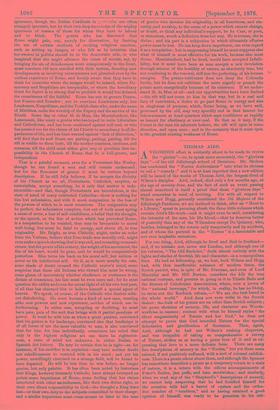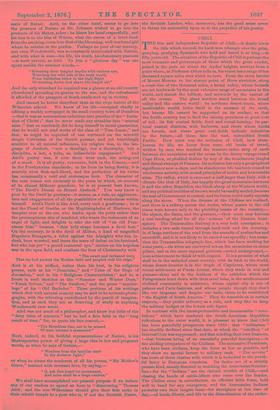THOMAS AIRD.
A VIGOROUS effort is evidently about to be made to revive the " glories "—or, to speak more accurately, the "glorious days "—of the old Edinburgh school of literature. Mr. Skelton has condensed the " Noctes Ambrosiame " into what he chooses to call a " comedy ;" and it is at least reported that a new edition will be issued of the works of Thomas Aird, the longest-lived of Wilson's disciples. Aird, indeed, died only a few months ago, at the age of seventy-four, and the fact of such an event passing almost unnoticed is itself a proof that these " glorious days " stand somewhat in need of reviving. For with all respect to Wilson and Hogg, generally considered the Dii Majores of the Edinburgh Pantheon, we are inclined to think, after an " Hour in a Library," spent-in peruaing afresh the three little volumes which contain Aird's life-work—and it might even be said, considering the intensity of the man, his life-blood,—that he deserves better of posterity than any of the Wilsonians except De Quincey, who, besides, belonged to the coterie only temporarily and by accident, and of whom the portrait in the " Noctes " is a lamentable and not even laughable caricature.
For one thing, Aird, although he lived and died in Scotland— and, if we mistake not, never saw London, and although one of his volumes, "The Old Bachelor," deals almost entirely with the lights and shades of Scottish life and character—is a cosmopolitan Scot. He had no fellowship, as, we fear, both Wilson and Hogg had, with that insufferable nuisance of modern times, the Scotch patriot, who, in spite of Mr. Freeman, and even of Lord Macaulay and Mr. Hill Burton, considers the kilt the true national costume, and persists in going in it to Thistle Balls and the dinners of Caledonian Associations, where, over a jorum of the "national beverage," for which, in reality, he has no liking, he raves out the Roebuck refrain,—" We are the best breed in the whole world." Aird does not even write in the Scotch dialect ; the bulk of his poems are on other than Scotch subjects ; his prose sketches of scenery, life, and character are Words- worthian in essence ; content with what he himself styles " the silent magnanimity of Nature and her God," he does not attempt to prove that God intended Nature for the special
delectation and glorification of Scotsmen. Then, again, Aird, although he had not Wilson's rushing eloquence, and was incapable of taking so comprehensive a survey of Nature, strikes us as having a purer love of it and as ex- pressing that love in a more delicate form. There are many fine descriptions of scenery in the "Nodes," but yet these seem tainted, if not positively suffused, with a sort of colossal caddish- ness. There is a picnic odour about them, and although Mr. Spencer has somewhere described a picnic as a temporary return to a state of nature, it is a return with the odious accompaniments of Foker's Entire, jam puffs, and ham sandwiches ; and similar%, when we read any of the " Shepherd's " descriptions of scenery, we cannot help suspecting that he had fortified himself for the occasion with half a barrel of oysters and the ortho- dox number of "tumblers," and so having attained a good opinion of himself, was ready to be generous in his esti-
mate of Nature. Aird, on the other hand, seems to go into the presence of Nature as Dr. Johnson wished to go into the presence of his Maker, sober ; he kisses her hand respectfully, and - his kiss is to the kiss of Wilson, what the caress of a lover fresh . from the smoking-room is to that of the blooming, well-nurtured girl whom he salutes in the garden. Perhaps no poet of our century, not even Wordsworth, was so constantly intoxicated with Nature, and with what in man—his life, his death, his elementary passions —is most natural, as Aird. To him a " glorious day " was one .spent amidst the summer woods,—
" Haunting their tangled depths with curious eye, Watching the wild folk of the leafy world, From beetledom below to the high flight Of shooting doves that shave the limpid air."
And the only stimulant he required was a glance at an old country .churchyard spreading its graves to the sun, and the refreshment it afforded of the prospect of death swallowed up in victory.
Aird cannot be better described than as the virgo intacla of the Wilsonian school. We know of his life—occupied chiefly in -editing a weekly newspaper in the small country town of Dumfries —that it was an unconscious reduction into practice of the " Imita- tion of Christ ;" that he never made any stumbles into " sensual mire ;" that so resolutely did he keep himself in moral quarantine, that he would not read works of the class of " Tom Jones ;" and
that, as might be expected of one nurtured on the severely .simple Calvinism of the Scotch peasant, and yet tremblingly sensitive to all natural influences, his religion was, in the lan- guage of Joubert, " not a theology, nor a theosophy, but a
discipline, a law, a yoke, an indissoluble engagement." And Aird's poetry was, if ever there were such, the acting-out of a creed. It is all purity, reverence, faith in the Unseen,—and in the Presbyterian standards ; so far from its being fleshly, it is scarcely even flesh-and-blood, and the perfection of his virtue has occasionally a cold and statuesque look. The character of the man comes out curiously in the poem by which, on account of its almost Miltonic grandeur, he is at present best known, -" The Devil's Dream on Mount Aksbeck." You may know a -poet by the Devil he portrays—it means, as a rule, an agglomera- tion and exaggeration of all the possibilities of wickedness within himself. Aird's Devil is like Aird, every inch a gentleman ; he is mot the Fiend of Goethe or the Mephistopheles of Marlowe, the tempter ever at the ear, who trades upon the petty rather than the presumptuous sins of mankind, who wears the vestments of an angel of light, and delights to take the role of "an old Fran-
ciscan friar" because "that holy shape becomes a devil best." On the contrary, he is the devil of Milton, a kind of magnified Napoleon Bonaparte, a rebel against the Almighty who has, in- deed, been worsted, and bears the scars of defeat on his forehead, but who has yet " a proud immortal eye," carries on his hopeless
-war in the open field, and combats the foes of Christianity with
"The swart and turbaned train That far had pushed the Moslem faith and peopled well his reign."
Aird is at his stiffest, rather than his best, in his religious poems, such as his " Demoniac," and " Tales of the Siege of Jerusalem," and in his "Religious Characteristics;" and he is freest in such sketches as the " Summer and Winter Days," "Frank Sylvan," and " The Swallow," and the prose " saunter- Inge " of his " Old Bachelor." Those portions of his writings -which deal with natural scenery may be said to be accurate photo- graphs, with the colouring contributed by the pencil of imagina- tion, and as such they are as deserving of study as anything
Wordsworth ever wrote.
Aird was not much of a philosopher, and knew but little of the '" fairy tales of sciences," but he had a firm faith in the " long -result of time ;" for, to quote his fine conceit,— " The Boundless One, not to be missed Of man, became a mannerist."
Next, indeed, to his faithful representations of Nature, is his Shakespearian power of giving a large idea in few and pregnant words, as when he says of Genius,— "Wonders from the familiar start In thy decisive light;"
or when he closes the tenderest of all his poems, "My Mother's -Grave," instinct with reverent love, by saying,—
" 0, ask this heart for monument, And mine shall be a large content."
We shall have accomplished our present purpose if we induce any of our readers to spend an hour in " discovering " Thomas Aird ; and the neo-Wilsonians should give their first niche in their rebuilt temple to a poet who is, if not the Scottish Dante, the Scottish Landor, who, moreover, has the good sense never to thrust his nationality upon us to the prejudice of his poetry.



































 Previous page
Previous page